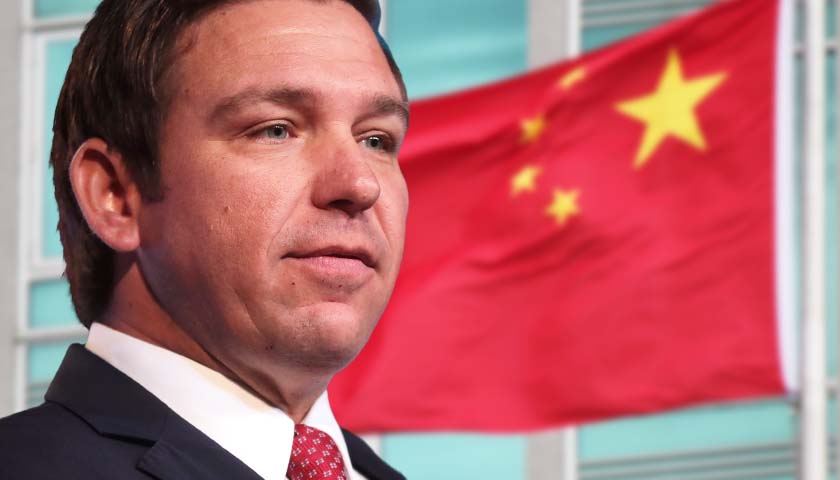by Bethany Blankley
Florida Gov. Ron DeSantis said he’s considering banning Chinese entities from purchasing property in Florida and that the state legislature was looking at ways to further restrict the communist country’s influence in Florida.
“We don’t want to have holdings [in Florida] by hostile nations. If you look at the Chinese communist Party, they’ve been very active gobbling up land … and when they have interests that are opposed to ours and we see how they have wielded their authority especially with President Xi [Jinping], who’s taken a much more Marxist-Leninist turn, that is not in the best interest of Florida to have the Chinese Communist Party owning farm land, owning land close to military bases.”
While there’s widespread agreement among lawmakers over preventing the CCP from owning farmland and land close to military bases, DeSantis asked, “but why would you want them buying residential developments and things like that? I don’t want them owning subdivisions and things like that.”
According to a 2022 National Association of Realtors report, Chinese investors accounted for 6 percent of foreign buyers who spent over $6 billion on U.S. real estate between March 2021 and March 2022. Top foreign buyers were from Canada and Mexico.
Foreign buyers purchased the most U.S. land in Florida, of 24 percent. California land accounted for 11 percent, Texas land, 8 percent.
The legislature will likely be addressing the issue when it convenes March 7.
“The issue is going to be, obviously, if someone comes in and buys, it’s not the CCP that’s signing that,” DeSantis said. “These are holding companies … So you have to structure that in a way that will effectively police it. … We do not need to have CCP influence in Florida’s economy.”
The legislature will also be looking to ban Chinese involvement with research at Florida universities and colleges, DeSantis said, after the state already banned the Confucius Institute from them. The institutes were used to “bring propaganda into our universities, as if our universities don’t have enough problems already,” he said, adding that he thinks the legislature “will have an appetite to do even more.”
DeSantis has been consistent with his policy objectives. Last fall, he signed an executive order prohibiting government entities from procuring technology products and services from companies owned by, controlled by or domiciled in the seven foreign countries of concern, with China at the top of the list. Other countries include Cuba, Iran, North Korea, Syria, Russia and Venezuela.
“From server farms to farmland, the Communist Party of China has been worming its way into our nation’s data storage systems and buying up tracts of land near sensitive national security sites,” DeSantis said when he issued the order. “By prohibiting the purchase of lands, state contracts with Chinese technology firms, and the infiltration of CCP-affiliated groups such as Confucius Institutes, Florida is leading the way to protect our nation from international foes.”
In 2021, Florida changed its retirement system fund strategy to ensure state funds weren’t invested in Chinese or “woke corporations.” Trustees of the State Board of Administration, who oversee the state’s retirement system also ended proxy voting and expanded audits of the system.
“For far too long, the communist regime in China has attempted to infiltrate our financial and educational institutions,” Lt. Gov. Jeanette Nuñez said of the SBA’s actions. They would “curb China’s investment in industries critical to our national security and protect Floridians from the dangers posed by the Chinese Communist Party.”
DeSantis also last year first established a Victims of Communism Day in Florida to honor those who’ve suffered from communist regimes at an event at which Nuñez described the experience of her parents living in communist Cuba.
Of Florida’s economy, the fourth largest in the U.S., and the 16th largest if it were its own country, DeSantis said, “we’re a force to be reckoned with.”
“The U.S. is too dependent on China,” he added. When COVID hit and the U.S. needed supplies, he said, “I think 100 percent of supplies were made in China. Why would you want to rely on a hostile nation for things that are integral for our way of life and security? Disentangling from China is something that is very significant.”
– – –
Bethany Blankley is a regular contributor to The Center Square.
Photo “Ron DeSantis” by Gage Skidmore. CC BY-SA 2.0. Background Photo “Chinese Flag” by Tomas Roggero. CC BY 2.0.





